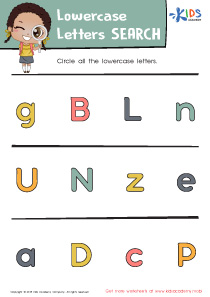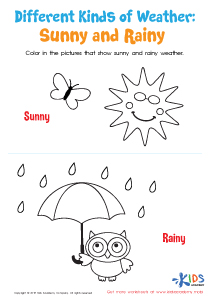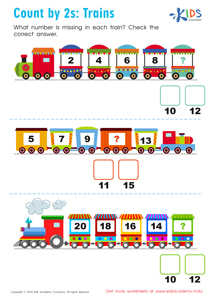Normal Counting and Cardinality up to 20 Quizzes for 5-Year-Olds
6 results
6 filtered results
Clear all filters6 filtered results
-
From - To
Dive into the world of numbers with our "Normal Counting and Cardinality up to 20 for 5-Year-Olds" interactive assessment quizzes! Crafted specifically for young learners, these quizzes offer a delightful journey through the basics of counting and understanding numbers up to 20. As your child navigates through each question, they receive immediate feedback that fosters learning and correction. This tool is perfect for ensuring a strong foundation in counting and cardinality, all while keeping the learning process fun and engaging for 5-year-olds. Let your child explore the magic of numbers with us today!
In today's fast-paced educational landscape, it's essential to lay a strong foundation in basic math skills for young learners. Particularly, mastering Normal Counting and Cardinality up to 20 is a crucial stepping stone for 5-Year-Olds who are just embarking on their mathematical journey. Our interactive quizzes tailored specifically for this age group serve as an invaluable tool in bolstering their understanding and confidence in this fundamental area.
Counting and cardinality are the bedrocks of mathematics. These concepts go beyond mere rote memorization of numbers; they entail understanding the quantity each numeral represents and being able to compare and manipulate these quantities. For 5-year-olds, developing proficiency in Normal Counting and Cardinality up to 20 is not just about learning to count from 1 to 20; it's about grasping the essence of numbers, their order, and their relevance in the world around them. Our interactive quizzes are designed to foster this deep understanding in a fun, engaging, and highly effective manner.
One of the key advantages of utilizing our quizzes in children’s studies is the interactive format. Interactive learning has been shown to significantly increase engagement rates among young learners, keeping them motivated and more likely to retain the information they learn. By incorporating vibrant visuals, captivating challenges, and immediate feedback, our quizzes make learning feel like play. This playful approach reduces anxiety and resistance, turning what could be a tedious task into an enjoyable and rewarding experience.
Moreover, the quizzes are structured to cater to various learning styles. Whether a child is a visual, auditory, or kinesthetic learner, the diverse range of activities and questions ensures that every child finds a path that resonates with them. This inclusive approach helps in accommodating the individual needs of 5-Year-Olds, providing a more personalized learning experience that can adapt to the pace and style of each learner.
The progression through the quizzes is thoughtfully designed to build confidence along with competence. Starting with simpler concepts and gradually introducing more complex ones, the quizzes scaffold learning in a way that feels natural and achievable. This incremental approach helps maintain a positive learning curve, ensuring that children do not feel overwhelmed or discouraged. Celebrating each milestone along the way, the quizzes imbue young learners with a sense of accomplishment, fostering a growth mindset that is essential for lifelong learning.
Feedback is another cornerstone of our interactive quizzes. Instantaneous, constructive feedback allows children to understand their mistakes and learn from them immediately. This real-time guidance helps in solidifying concepts and correcting misconceptions on the spot, paving the way for a more robust understanding of Counting and Cardinality.
In conclusion, our Normal Counting and Cardinality up to 20 quizzes for 5-Year-Olds are more than just an educational resource; they are a gateway to a deeper understanding and appreciation of mathematics. By engaging young minds in an interactive, supportive, and enjoyable learning environment, we are not only helping them master essential mathematical concepts but also instilling a love for learning that will benefit them across all areas of study. Empowering children with these skills at such a formative age lays the groundwork for their future academic success and paves the way for them to become confident, competent, and curious learners.














